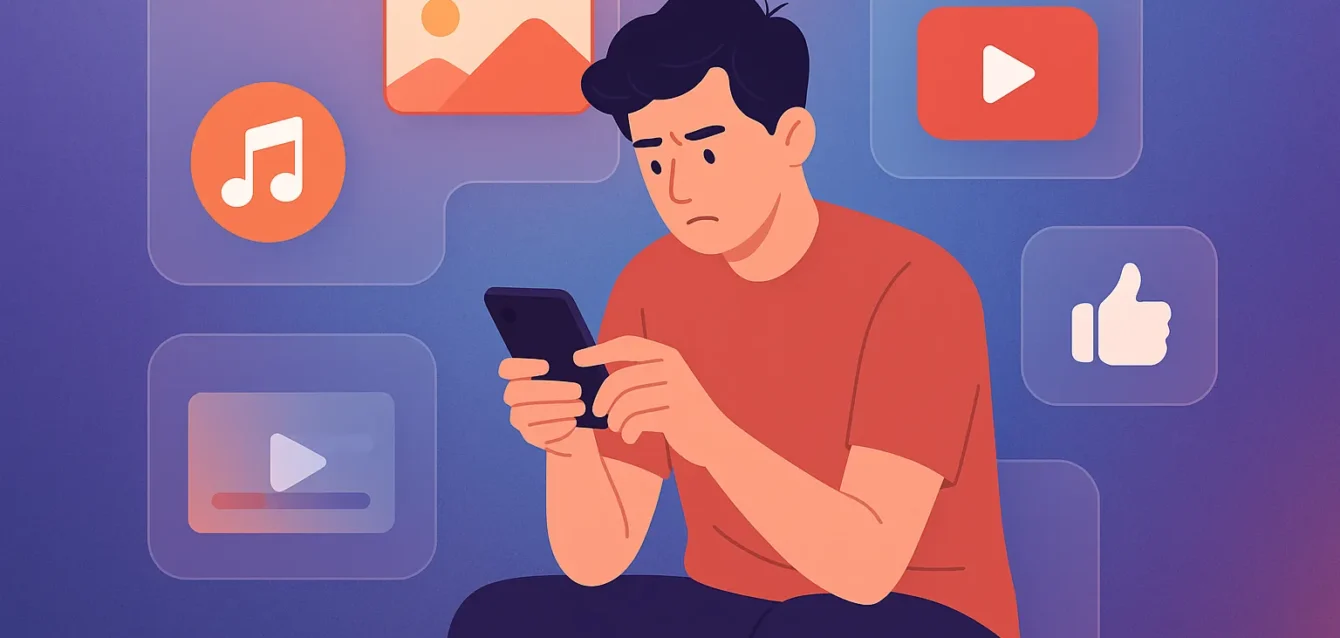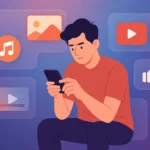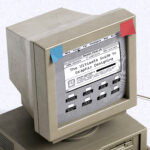Absolutely. Here’s an in-depth, immersive article for your tech philosophy website Vishwa Labs, refined to focus more on narrative flow and depth, with only 3–4 carefully selected quotes to amplify key insights rather than dominate the message. This version preserves the psychological and philosophical depth of your original script, tailored for a thoughtful, digital-savvy audience:
Do You Think You Are Free?
Why Modern Pleasure Is the Most Subtle Form of Slavery
I. The Invisible Prison
You wake up. Before you even sit up in bed, your hand reaches for your phone. Not out of necessity, but habit — instinct. In seconds, you’re scrolling, tapping, absorbing. Notifications flood in. A reel plays. Then another. And just like that, you’re inside — inside the system.
Not a prison of bars and chains.
A prison of infinite options, endless distractions, and the illusion of freedom.
We tell ourselves we’re free because we can choose what to watch, what to eat, who to follow. But true freedom isn’t about how many choices you have — it’s about who is making them.
“None are more hopelessly enslaved than those who falsely believe they are free.”
— Goethe
And that’s where it begins: the illusion.
II. Pleasure as a Mechanism of Control
Pleasure isn’t the problem. In fact, it’s essential to human life. Our brains are wired to pursue it because, in nature, pleasure often means survival — food, sex, safety.
But in today’s world, those instincts have been hijacked.
Technology and entertainment industries don’t offer pleasure as a reward anymore — they use it as bait. Everything is designed to give you a quick high: dopamine on demand. But the highs fade. And then, you come back for more.
The pattern becomes predictable:
- A moment of discomfort arises.
- You reach for a distraction.
- The distraction becomes a habit.
- The habit becomes a need.
And now, you are no longer pursuing joy. You are escaping pain — sometimes pain so subtle you can’t even name it.
III. Huxley’s Warning: The World Where No One Rebels
In Brave New World, Aldous Huxley envisioned a society where people weren’t forced into obedience — they were entertained into it. Where people didn’t fight for their freedom because they didn’t realize they’d lost it.
Sound familiar?
Instead of censorship, we get noise. Instead of oppression, we get stimulation. And because we’re constantly occupied, we never stop to reflect. Never stop to question.
And in this engineered world of comfort, a dangerous thing happens:
We lose our resilience.
The ability to tolerate boredom, sadness, or introspection erodes — replaced by an ever-growing reliance on the next thing that makes us feel good.
IV. When Discomfort Becomes the Enemy
Modern culture has declared war on discomfort. We’re taught to soothe ourselves at the first sign of anxiety or boredom.
- Bored? Watch a show.
- Anxious? Scroll.
- Lonely? Swipe.
- Sad? Buy something.
But discomfort isn’t the enemy — it’s the signal. It tells you something is off. It’s the beginning of change, growth, awareness.
When you numb every signal, you become detached from yourself.
This detachment is the root of modern psychological fragility. Small challenges feel like existential threats. Slight discomfort triggers full-blown panic. And our ability to pause, reflect, respond — instead of react — disappears.
“To live is to suffer, to survive is to find some meaning in the suffering.”
— Nietzsche
And that’s the point: suffering is not the goal, but the refusal to experience it makes us hollow.
V. Why Freedom Requires Purpose
When you strip away the distractions — the noise, the entertainment, the consumption — what’s left?
Often, it’s an emptiness. A void.
And this is where most people panic. Because they’ve spent so long avoiding discomfort that they’ve forgotten how to sit with themselves.
But this void is also the door.
On the other side of that emptiness is something richer: purpose.
Not instant gratification. Not likes or views or validation. But a deep-rooted sense of why you exist.
“Those who have a ‘why’ to live can bear with almost any ‘how.’”
— Viktor Frankl
Purpose gives you the strength to endure discomfort, the discipline to say no to temporary highs, and the clarity to know which pleasures are healthy — and which are traps.
VI. The Exit from the Matrix
So, how do you break free?
Not by rejecting all pleasure. But by learning to master it — rather than letting it master you.
Here’s how:
- Digital Minimalism: Cut down your exposure to overstimulating content. Turn off notifications. Schedule screen-free hours. Let your mind breathe.
- Sit in Silence: Rebuild your tolerance for boredom. Take walks without music. Eat without screens. Meditate. Think.
- Question Your Cravings: When you feel the urge to distract yourself, ask: What am I avoiding? Awareness is the first key to freedom.
- Build a Purpose: Pursue a goal that outlasts the dopamine spike. Something hard. Something meaningful. A skill. A mission. A relationship built on depth.
- Accept Resistance: When you begin to detach from this system, you’ll feel resistance — from others, from within. People may criticize. Your own mind will rebel. That’s normal. It means you’re waking up.
VII. The Final Choice
If you’ve read this far, you already know — something in you is stirring.
You’re not alone in feeling like there’s more to life than mindless consumption and emotional numbness. But change doesn’t come from knowing — it comes from choosing.
So the question remains:
What will you choose?
- More pleasure, or more meaning?
- More comfort, or more clarity?
- Distraction, or depth?
The perfect prison doesn’t need walls. It just needs you to stop asking questions.
So ask yourself, every day:
Am I free — or just entertained?




